(With information from United Nations news releases)
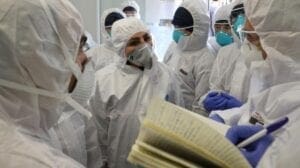 I live in Queens, New York, the epicenter of the Covid-19 virus in the United States. We will be staying at home a minimum of about another two weeks. We’re not unique in this experience. Millions of others globally are doing the same. But while I need only worry about cleaning closets or comparing the cost of household items on the internet, millions of people face far more urgent concerns.
I live in Queens, New York, the epicenter of the Covid-19 virus in the United States. We will be staying at home a minimum of about another two weeks. We’re not unique in this experience. Millions of others globally are doing the same. But while I need only worry about cleaning closets or comparing the cost of household items on the internet, millions of people face far more urgent concerns.
Many people have poor access to health care and health care workers struggle to find sufficient personal protective equipment or respirators. Persons without homes may find it very difficult to access a bathroom or food, or afford protective products such as hand sanitizer. Some people are unable to self-isolate because they live in cramped quarters. Elderly persons can feel at risk of contracting the virus if they go out to purchase needed food and supplies. Families with a member in hospital may not be able to visit their loved one. Many people in informal work sectors cannot earn enough to purchase food. Others have no access to water.
Since the Covid-19 pandemic is experienced globally, one might ask, “What is the United Nations doing to address the crisis?
HUMANITARIAN AID IMPORTANT
Jens Laerke, Deputy Spokesperson for OCHA (United Nations Office for Coordination of Humanitarian Affairs), aptly pointed out that some countries affected by the pandemic are already suffering other humanitarian crises due to conflicts, natural disasters and climate change. Their needs are many.
“It is extremely important that we continue the life-saving work in these countries,” he said, “and that we sustain the humanitarian response across the world”.
To fight COVID-19 in 51 countries located in South America, Africa, the Middle East, and Asia, UN Secretary General Antonio Guterres recently launched a coordinated global humanitarian response plan, appealing for US $2 billion.
“COVID-19 is menacing the whole of humanity – and so the whole of humanity must fight back. Individual country responses are not going to be enough,” the Secretary-General said.
“We must come to the aid of the ultra-vulnerable – millions upon millions of people who are least able to protect themselves. This is a matter of basic human solidarity. It is also crucial for combating the virus. This is the moment to step up for the vulnerable.”
SECRETARY GENERAL REQUESTS GLOBAL CEASE-FIRE
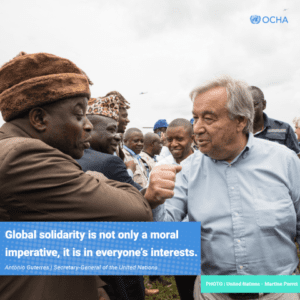
Photo Courtesy of UNESCAP
On March 25, Mr. Guterres called for a global cease-fire, so that nations could focus upon addressing the Covid 19 virus.
“It is time to put armed conflict on lockdown and focus together on the true fight of our lives,” he said.
This (cease-fire) is crucial, said Gutteres, “to help create corridors for life-saving aid. To open precious windows for diplomacy. To bring hope to places among the most vulnerable to COVID-19.”
Pope Francis, on March 30, followed with an appeal to cease any form of hostilities. Some progress is being made in that several armed groups in Cameroon, the Philippines, Yemen and Syria have initiated steps to cut back on violence in recent days.
UNCTAD REVEALS PLAN TO ADDRESS POTENTIAL “LOOMING FINANCIAL TSUNAMI”
On Monday, UNCTAD, the UN trade and development body, said that commodity-rich exporting countries will face a $2 trillion to $3 trillion drop in investment from overseas in the next two years. It called for a $2.5 trillion dollar rescue package to increase resilience to hardship in developing nations.
UNCTAD developed a four-point strategy to address a “looming financial tsunami” which may follow the virus. That plan calls for a $1 trillion investment for weaker economies, a debt freeze for distressed economies (an immediate standstill on sovereign debt payments followed by debt relief), and a $500 billion investment in poorer countries’ emergency health services and related social relief program. UNCTAD also is urging State-led capital controls to stem capital outflows from developing countries.
CALL TO PROTECT HEALTH WORKERS
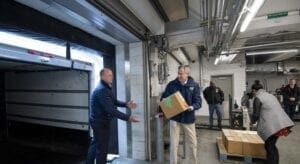
Photo Courtesy of UNRIC
UN Special Rapporteur on the implications for human rights of the environmentally sound management and disposal of hazardous substances and wastes, Baskut Tuncak, called health care workers “heroes” who “must be protected,” as he discussed deficits in personal protective equipment needed to keep them from becoming infected. He called for public and private funds to ensure that PPE and other medical supplies are universally available and accessible.
The World Health Organization, a UN specialized agency, has shipped personal protective equipment (PPE) to nearly 70 countries, while 120 nations have received 1.5 million diagnostic kits.
FAO WARNS OF POTENTIAL FOOD CRISIS
The Food and Agriculture Organization, another specialized agency of the UN, warned Monday of potential global food shortages unless measures are taken to “protect the most vulnerable, keep global food supply chains alive, and mitigate the pandemic’s impacts across the food system.”
FAO Chief Economic, Maximo Torero Cullen notes that there is plenty of food, but restrictions on who may go to work, border closures, and lockdowns are having an effect on farm workers and supply chains, which impacts shippers.
RADIO USED TO CONVEY COVID-19 INFORMATION
Communications can be a challenge in some countries. Imagine trying to stay up on the latest information about the virus if you live in a location with poor internet access. UN peace-keeping radio stations are sharing information about the virus with vulnerable communities in nations affected by conflict, as well as awareness about how the people can protect themselves.
GA PRESIDENT—“WE NEED TO GALVANIZE MULTILATERAL ACTION NOW”
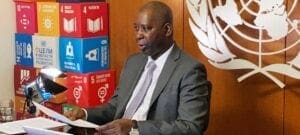 General Assembly President, H.E. Tijjani Muhammad-Bande, recently spoke to the UN’s Fifth Committee, which met virtually. The Fifth Committee deals with administrative matters and budget. Mr. Muhammad-Bande told participants that not only must the virus be addressed, but also its social and economic impacts. “We need to galvanize multilateral action now to protect gains made towards the eradication of poverty and zero hunger, as this crisis puts a strain on food production and supply chains, among others,” he said.
General Assembly President, H.E. Tijjani Muhammad-Bande, recently spoke to the UN’s Fifth Committee, which met virtually. The Fifth Committee deals with administrative matters and budget. Mr. Muhammad-Bande told participants that not only must the virus be addressed, but also its social and economic impacts. “We need to galvanize multilateral action now to protect gains made towards the eradication of poverty and zero hunger, as this crisis puts a strain on food production and supply chains, among others,” he said.
SECRETARY GENERAL ASKS G-20 TO WORK TOGETHER TO STOP VIRUS
Last week, the G-20, the foremost forum of international economic cooperation, met in Osaka Japan. It includes 20 countries which represent about 80 percent of the world’s economic output. In Osaka, Secretary General Antonio Guterres appealed to members for collective action to stop the virus and minimize its impact. He further asked for support in accelerating the achievement of the Sustainable Development Goals.
UN country teams are redoubling support for frontline responders and working to help vulnerable countries strengthen healthcare infrastructure. They are also working to curb hate crimes against persons wrongfully perceived to be purveyors of the virus. The UN is doing much more. For further information about UN activities related to the covid-19, go to this link: https://news.un.org/en/tags/coronavirus
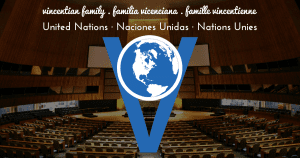







Thanks for reminding us of the risk to the “ultra-vulnerable” of our world.